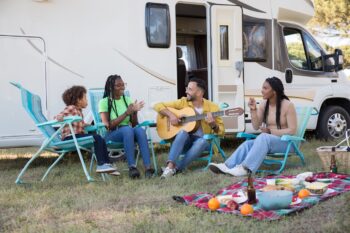Tips for Homeschooling Your Kids While Living the RV Life

Constant motion doesn’t have to derail learning. The rhythm of the road can sharpen curiosity and resilience. When you’re homeschooling in a recreational vehicle (RV), imagine your route as a living syllabus and your campsite as a pop-up classroom.
With some structure, smart packing, and community, you can turn miles into lessons. Design routines that travel well, use places you visit as authentic curriculum, stay orderly in small spaces, and nurture friendships along the way.
Plan a Flexible Routine
Replace the nine-to-three mindset with daily anchors: a morning read-aloud, a midday skill block, and an evening reflection. Use checklists so kids can work independently during long drives, then save experiments, art, and messy projects for days when you’re parked.
Set modest, portable weekly targets—one math unit, a writing draft, and a science observation log—and revise them when weather or repairs disrupt plans. Protect sleep and meals to preserve attention, and schedule catch-up days so nobody falls behind.
Use the Road as Your Classroom
Treat destinations as lesson catalysts. Track mileage for math, map routes for geography, and keep nature journals to practice scientific habits. Local museums, ranger talks, farms, and historical sites provide field experiences; rotate which child leads questions to build confidence.
Download audio courses and e-books for offline days, and invite kids to produce trip reports—short videos, postcards, or photo essays—that showcase learning without paper clutter. Add service projects, like trail cleanups, to connect academics and stewardship.
Stay Organized With Compact Systems
Space is limited, so choose multi-use tools: a laptop, a tablet, dry-erase boards, and a rolling crate for core books. Give each child a zipper pouch for pencils, flash cards, notebooks, and headphones, and label everything.
File papers in color-coded envelopes and keep one expanding folder for records. Carry a small printer or use library print-on-demand. Back up work weekly to the cloud and a thumb drive. Create a quiet kit with headphones, a timer, and fidgets to support focus.
Protect Socialization and Community
Learning thrives with people. Join traveling homeschool groups, campground co-ops, or park-based junior ranger programs to add peers and mentors. Schedule video calls with friends and grandparents for read-alouds or show-and-tell. Sports and classes can be drop-in: climbing gyms, community pools, makerspaces, and library clubs welcome visitors.
Teach kids to exchange emails or pen-pal letters with new friends, and model thoughtful online behavior. Parents benefit from support too—swap teaching days with others, compare curricula, and take turns planning outings.
Conclusion
Homeschooling on wheels works best with intention: clear anchors, portable tools, and relationships that travel with you. Keep plans light, notice the learning in everyday miles, and celebrate progress rather than perfection. With patience and wonder, you will find that school fits the journey—not the other way around.

